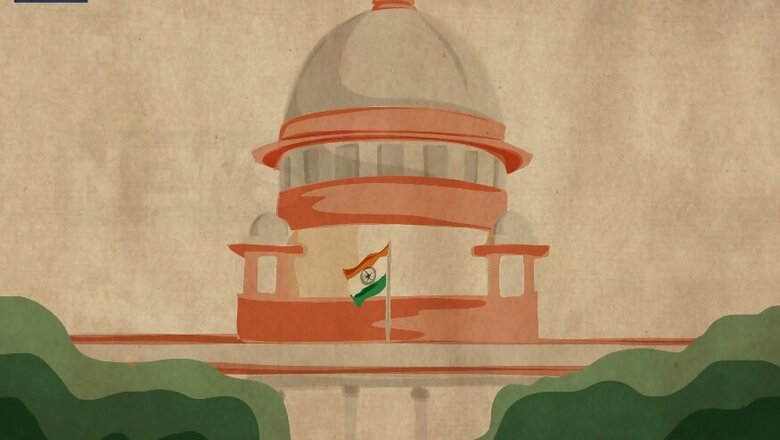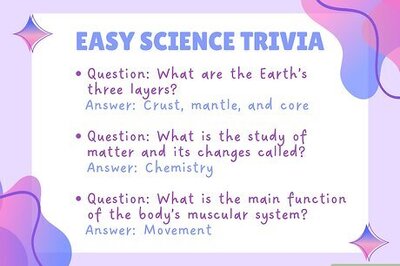
views
New Delhi: Terming as "so sad" the fight between National Commission for Protection of Child Rights (NCPCR) and West Bengal State CPCR over jurisdiction, the Supreme Court Monday said these forums cannot become means of obtaining "trappings of power" like official cars or bungalows.
The apex court said these commissions must function only for the protection and betterment of children who have "no voice", and in a "spirit of cooperation" as they are in the "nature of siblings".
"These commissions cannot become sources of power, self-aggrandisement or means of obtaining the trappings of power like official cars, bungalows etc," a bench of Justices Deepak Gupta and Aniruddha Bose said.
"The people who are appointed to such commissions must in a true sense be friends of the children, willing to spend their time and energy to help children rather than pushing their own personal or political interest," the bench said in its 40-page judgement.
The top court delivered its verdict on an appeal filed by the NCPCR against a Calcutta High Court order staying its proceedings in a case related to alleged gross violation of rights of orphaned children in West Bengal.
In the high court, the NCPCR and the state commission were at loggerheads over alleged trafficking of 17 children from a child care institution in Jalpaiguri district. While the NCPCR blamed local administration for the thriving trafficking racket, the state government questioned its jurisdiction in the high court.
In its verdict, the top court said these commissions have been set up with a view to not only protect rights of children but also to suggest ways and means of enhancing the rights of children, ensuring that laws made for the protection of minors are effectively implemented.
"We are dealing with children who cannot complain. The commissions are meant to protect children who have no voice. It is these commissions who have to give voice and feelings to the distress calls of children," the bench said.
"It's so sad! We start with a lament because institutions set up to protect children have virtually forsaken them in a fight over their so called jurisdictions," the bench said at the outset. The apex court said it sees no reason as to why there should be any disharmony and lack of coordination between these two institutions.
"This non-cooperation and lack of coordination can only occur when the persons manning the institutions put their own interests over the interest of the children. It is only when those in-charge of such commissions give themselves so much importance that they forget that they are the creation of statute, the only purpose of which is to protect children," it said.
"We are sorry that this court has to spend its time resolving such disputes. This court as well as the two major parties litigating before us definitely have better things to do," it said.
Detailing the sequence of events in the case, the bench noted that the NCPCR had taken cognisance of news reports on March 3, 2017 about alleged trafficking of children from a child-care institution and its two members went to Jalpaiguri on March 7, 2017.
It noted that NCPCR had requested the state officials to provide them some information which, according to the national commission, was not provided after which they summoned the Additional Director General of Police (ADGP), CID of West Bengal to appear before it.
The bench noted that ADGP had filed a writ petition challenging the NCPCR's jurisdiction to summon him and the high court had in August 2017 stayed the direction on the ground that since the state commission had taken cognisance of the matter on February 24, 2017, the national commission prima facie had no jurisdiction.
The bench also made it clear that no person, including members of NCPCR or any state commissions, are permitted to take media with them when they visit any of the homes set up under the Juvenile Justice Act or under any other law as "the privacy of the children is of the highest importance".
Referring to the provisions of the Commissions for Protection of Child Rights Act, 2005, the apex court said that the NCPCR and state commissions have been "clothed with identical powers and functions".
The bench also noted that the ADGP was "obviously not cooperating with the NCPCR for reasons best known to him" and the police officials should realise that when the commissions constituted under the Act ask for some relevant information, they must respectfully reply to the same and not rake up the dispute of so-called jurisdiction.
Referring to the facts of the case, the bench said the state commission had not started an inquiry into the matter till March 7, 2017.
"As clearly held by us above, both the Commissions have to work for the best interest of the children in a spirit of cooperation. Unfortunately, in this case, there has been no cooperation rather mudslinging at each other," it said, pulling up both the NCPCR and state commission.
The bench said other issues including appointment of Child Welfare Committees and their heads in West Bengal should be monitored by the Calcutta High Court.




















Comments
0 comment